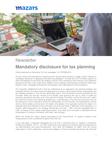
Mandatory disclosure for tax planning
The tax reform bill submitted to Congress by the Government contains a chapter called "Regime of mandatory disclosure of aggressive tax planning strategies". Through this, the Promoters (person or office that designs the tax planning strategy) and the Users (taxpayers that execute it) are obliged to disclose to the Dian, with a high level of detail, the tax strategy implemented, so that this entity may, based on this, investigate and sanction the taxpayer and create special control programs.
The regulation establishes that it must be understood as an aggressive tax planning strategy and indicates that the information to be provided about it must be so clear that the entity understands how the strategy operates or how the tax advantage arises. This information must be disclosed by the Promoter within the first two months of the taxable year following the one in which it made the schemes available to the User and, in the case of a Foreign Promoter, it will be the User who -within the first three months of the following taxable year- must disclose it. The Dian will issue the forms for the disclosure of this information where the identification of the Promoter, the beneficiaries, among others, will be stated, and the other information (the details of the operation) will be the object of a separate document. Based on this information, the Dian will make a "labeling" of the taxpayers in a registry called (Aggressive Tax Strategy Identification Number - "NIE") and will segregate them in order to, based on this, initiate auditing processes. Only when this information is disclosed will the computation of finality of Promoters' and Users' returns begin.
Within the whole tax reform project presented by the Government, no section contains more transgressions to the constitutional regime than this one.
In the first place, it flagrantly disregards the rule that in Colombia there is freedom of enterprise (Political Constitution -C.P.C.- art. 333), and that as a consequence of that principle all entrepreneurs -as administrators and good businessmen- are under the obligation to watch over the correct organization of their companies, meaning the adoption of the tax benefits granted by law that best suit their organization. The aforementioned article of the Civil Code establishes that "no one may demand prior permits or requirements".
Secondly, it flagrantly ignores the rule that, in Colombia, good faith is presumed (art. 83 and 29 inc. 4 of the C.P.) and that no one is obliged to declare against himself (art. 33 C.P.), therefore, there is no place for the classification and "labeling" of taxpayers, when they are making use of the same benefits that the law has created for them. If what is intended is a regime of total transparency, the Dian should make public its auditing programs and should open to the taxpayer all the reserved information that it intends to use to proceed against businessmen.
Thirdly, the law ignores that the professional secrecy of lawyers, accountants and tax advisors is inviolable (art. 74 of the Civil Code) and that correspondence and other forms of private communication are also inviolable (art. 14 of the Civil Code). Therefore, unless there is a judicial proceeding in which a judge lifts said confidentiality, it must be respected.
Finally, the law does not recognize that all persons have the right to their personal and family privacy and to their good name "and the State must respect them and ensure that they are respected" (art. 15 of the Constitution), therefore, there can be no discrimination or special records (typical of totalitarian regimes) for those who decide to organize their affairs in accordance with the benefits granted by law.


